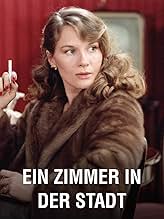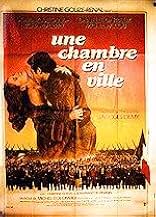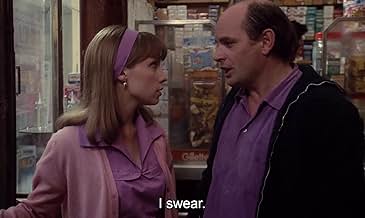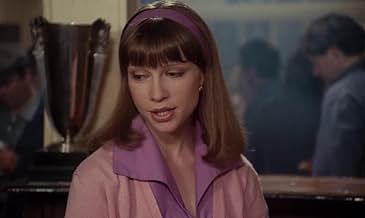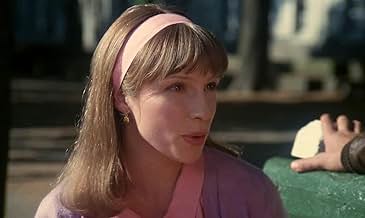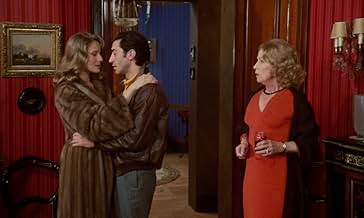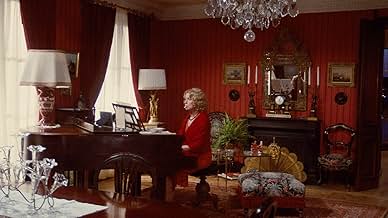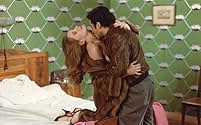AVALIAÇÃO DA IMDb
6,7/10
1,8 mil
SUA AVALIAÇÃO
Adicionar um enredo no seu idiomaAmid an ongoing workers' strike, a steelworker falls in love with the daughter of his baroness landlady, even though both are already in relationships.Amid an ongoing workers' strike, a steelworker falls in love with the daughter of his baroness landlady, even though both are already in relationships.Amid an ongoing workers' strike, a steelworker falls in love with the daughter of his baroness landlady, even though both are already in relationships.
- Prêmios
- 3 vitórias e 10 indicações no total
Florence Davis
- Edith
- (canto)
Avaliações em destaque
I had thought Jacques Demy had abandoned his movie operas after the 1960s, but no, he hadn't, and here's the proof. He's working with Colombier instead of LeGrand, and there's a lot more recitative, but unlike others who have tried to translate opera onto the screen, he has cinematographer Jean Penzer shoot it like a movie.... although Mme. Darrieux's flat does look like a stage design.
I do wonder if her daughter is wearing only a fur coat, as the dialogue indicates.
I do wonder if her daughter is wearing only a fur coat, as the dialogue indicates.
'Une chambre en ville' was thoroughly underrated from the start. In 1982 audiences no longer favoured tragic movies. BUT WHY? A generation earlier television had strongly reduced the audience of the cinemas. But television had NOT changed the taste. Video had a more profound influence. Take a standard situation. A group is watching a video which may evoke strong emotions in some of the spectators. Suddenly another catches the remote control, rewinds the movie and makes some comment (e.g., 'Girls should never have such a coiffure'). Repeated exposure to experiences of this kind may reduce the capacity for becoming emotionally aroused by movies. - Note that this is a recent development. It is easy to assemble a list of 100 very tragic movies produced 1935-1965, which at that time were highly appreciated by the average film-goer. I am even convinced that the average film-goer of this period would have loved contemporary movies such as 'Stormy Weather' (by Solveig Anspach) and 'Les diables' (by Christophe Ruggia).
If your aim is not emotional experience, you are likely to be disappointed by 'Une chambre en ville', despite its excellent merits. But please note that my review is one-sided and might be misleading. I intend to say much about the music, and shall reduce all other aspects to the bare minimum. What is the plot? Workers are striking. During a demonstration one of them (Francois) is shot by the police. He dies in the arms of his beloved (Edith). But only one day earlier he had abandoned his pregnant girlfriend (Violette), because he had met a very beautiful over-class girl. Francois and Edith were immediately overwhelmed by genuine and reciprocal passion.
Even among film musicals it is infrequent that every line is sung. Hence, it is natural to compare 'Une chambre en ville' with 'Les parapluis de Chèrbourg'. Jacques Demy directed both. But different composers (Michel Colombier and Michel Legrand) wrote the music. I think both got the manuscript most suitable for their specific talent.
The music of 'Une chambre' differs from that of 'Les parapluis' foremost in three respects. Without ceasing to be real film music, it is more introverted, and it is closer to opera music. But the largest difference is the director's relation to the singers.
Whenever two persons sing simultaneously in 'Les parapluis', you can clearly perceive the words of each. Also, simultaneous singing never transgresses the kind of dialogues that may be found in purely spoken theatre. By contrast, 'Une chambre' contains a real duet: the loving couple sings the same text together in parallel sixths; a device clearly borrowed from the opera. - - - To avoid misunderstanding as regards my next point: numerous great composers have borrowed melodies or other things from each other. Borrowing is not a fault if the borrowed thing is used for new purposes. Since 'Une chambre' finishes with a love scene in which one of the couple dies, it is not far-fetched to associate to Wagner's 'Tristan and Isolde'. During the final scene of the movie the main musical theme is presented for the fourth time, and this time with new accompanying melodies played by the orchestra. Rightly or wrongly, I think that these melodies are to some extent inspired by Wagner's opera (bar 63-73 of the overture).
Any competent musical conductor would tell the singers to take some impression of the mood of the text. But the soundtrack of 'Les parapluis' never differs much from a neutral performance. Hence, it is hardly possible to decide whether or not Jacques Demy actually directed the singers before the soundtrack was made. But in 'Une chambre' it could hardly be more manifest that Demy has devoted as much direction to the singers as to the actors seen on the screen. From Violette's singing voice alone, no one could mistake her distress when Francois abandons her, and her feeling of being treated unjust when Francois tries to excuse his behaviour. - - - Suppose you do not understand French, and that you are listening to the soundtracks of both movies without seeing the pictures. You will nevertheless have a fair chance of correctly perceiving the emotions of many scenes of 'Une chambre'. You will be much less successful with 'Les parapluis'.
If your aim is not emotional experience, you are likely to be disappointed by 'Une chambre en ville', despite its excellent merits. But please note that my review is one-sided and might be misleading. I intend to say much about the music, and shall reduce all other aspects to the bare minimum. What is the plot? Workers are striking. During a demonstration one of them (Francois) is shot by the police. He dies in the arms of his beloved (Edith). But only one day earlier he had abandoned his pregnant girlfriend (Violette), because he had met a very beautiful over-class girl. Francois and Edith were immediately overwhelmed by genuine and reciprocal passion.
Even among film musicals it is infrequent that every line is sung. Hence, it is natural to compare 'Une chambre en ville' with 'Les parapluis de Chèrbourg'. Jacques Demy directed both. But different composers (Michel Colombier and Michel Legrand) wrote the music. I think both got the manuscript most suitable for their specific talent.
The music of 'Une chambre' differs from that of 'Les parapluis' foremost in three respects. Without ceasing to be real film music, it is more introverted, and it is closer to opera music. But the largest difference is the director's relation to the singers.
Whenever two persons sing simultaneously in 'Les parapluis', you can clearly perceive the words of each. Also, simultaneous singing never transgresses the kind of dialogues that may be found in purely spoken theatre. By contrast, 'Une chambre' contains a real duet: the loving couple sings the same text together in parallel sixths; a device clearly borrowed from the opera. - - - To avoid misunderstanding as regards my next point: numerous great composers have borrowed melodies or other things from each other. Borrowing is not a fault if the borrowed thing is used for new purposes. Since 'Une chambre' finishes with a love scene in which one of the couple dies, it is not far-fetched to associate to Wagner's 'Tristan and Isolde'. During the final scene of the movie the main musical theme is presented for the fourth time, and this time with new accompanying melodies played by the orchestra. Rightly or wrongly, I think that these melodies are to some extent inspired by Wagner's opera (bar 63-73 of the overture).
Any competent musical conductor would tell the singers to take some impression of the mood of the text. But the soundtrack of 'Les parapluis' never differs much from a neutral performance. Hence, it is hardly possible to decide whether or not Jacques Demy actually directed the singers before the soundtrack was made. But in 'Une chambre' it could hardly be more manifest that Demy has devoted as much direction to the singers as to the actors seen on the screen. From Violette's singing voice alone, no one could mistake her distress when Francois abandons her, and her feeling of being treated unjust when Francois tries to excuse his behaviour. - - - Suppose you do not understand French, and that you are listening to the soundtracks of both movies without seeing the pictures. You will nevertheless have a fair chance of correctly perceiving the emotions of many scenes of 'Une chambre'. You will be much less successful with 'Les parapluis'.
"Une Chambre de Ville" is a tragic opera set during the strike of a shipyard workers union in 1955. Against the backdrop of clashes between police and strikers, the story is about two star-crossed lovers.
Francois is one of the striking workers and Edith is the dissatisfied wife of a television salesman. Fate brings them together and the result feels Shakespearian. They sing of never-ending love, but this is a story about unhappiness--for them and the other main characters.
Though the lyrics/dialogue are rather unpoetic in a classical sense, the music is powerful and lyrical. Indeed, the musical score is one of the best parts of the film.
Noticeable attention has been paid the scenery, with an emphasis on bright colors, providing striking images.
The actors have adequate singing voices, but the central theme--the great love of Francois (Richard Berry) and Edith (Dominique Sanda)-- is unconvincing. Their love feels rather conventional, certainly not a love for the ages. The viewer wants to feel that each is an island oasis of love for the other, driving them to heights of passion and personal transformation. But instead they feel like two losers who converge for a desperate evening and remain unchanged. The musical score, which is so strong, promises a classic story of love, like "Phantom of the Opera", but the characters fall far short.
The film's ending is abrupt, and it serves to undermine the theme of everlasting love.
Francois is one of the striking workers and Edith is the dissatisfied wife of a television salesman. Fate brings them together and the result feels Shakespearian. They sing of never-ending love, but this is a story about unhappiness--for them and the other main characters.
Though the lyrics/dialogue are rather unpoetic in a classical sense, the music is powerful and lyrical. Indeed, the musical score is one of the best parts of the film.
Noticeable attention has been paid the scenery, with an emphasis on bright colors, providing striking images.
The actors have adequate singing voices, but the central theme--the great love of Francois (Richard Berry) and Edith (Dominique Sanda)-- is unconvincing. Their love feels rather conventional, certainly not a love for the ages. The viewer wants to feel that each is an island oasis of love for the other, driving them to heights of passion and personal transformation. But instead they feel like two losers who converge for a desperate evening and remain unchanged. The musical score, which is so strong, promises a classic story of love, like "Phantom of the Opera", but the characters fall far short.
The film's ending is abrupt, and it serves to undermine the theme of everlasting love.
I always love Demy, except the one discussing the pregnancy of a male-so called a comedy.. Bias, of course. He always give you classical fairy tales which takes you away from your real world. Then you are carried into another space, and you can fully focus on what you are watching. Please don't pause his movies or you'll definitely find them dull and boring! For me, his music strengthens the story. Females are all beautiful princesses or queens. immersed in love, in a way.. Catherine Denver is, of course, his perfect princess. In fact, no one is bad. Many hate his Donkey Skin but that's it's close to Plato's idea/ideal. Most important of all, his protest of war is so subtle that it goes deep down without any noticing...
How I never saw this movie and when the first line was spoken in singing way, I realize be treat a musical, not a classic musical as we get used to, just sung in every line, well it really weird to watch a movie, I love the ultimate musical "Les Miserables", taking in account the level of the budge they differ each other so much, "Une Chamble en Ville" is a small production a slow pace, sometimes still boring, nevertheless the story is great, the tragic tale took place at Nantes, during shipyard's strike (Which the French people loves to do) a humble worker François (Richard Berry) rent a room from a former Countess Margot (Danielle Darrieux) she has an unsatisfied married daughter Edith (Dominique Sanda in bold nudes scenes) due her husband Edmond (Michel Piccoli) actually is sexually impotent, in other hand François has been dating with Violette, who was pregnancy from him without notice by him, in fact François didn't love her, when he meets Edith the chemistry is overpowering and ends up in love night at cheap hotel, then all these facts are interwoven each other, a tragic tale sang on every line, fine movie, although it wasn't allowed to everyone!!!
Resume:
First watch: 2020 / How many: 1 / Source: DVD / Rating: 7.25
Resume:
First watch: 2020 / How many: 1 / Source: DVD / Rating: 7.25
Você sabia?
- CuriosidadesDemy's longtime collaborator, composer Michel Legrand, strongly opposed the movie's social themes and urged the director to not do the movie. He ended up not being associated with the movie at all, and even in the 2010s, he was still trashing the movie in interviews.
- Erros de gravaçãoAround 01:11:53, Edith is holding a fire gun. Around 01:11:57, Edith is holding her bag and puts a tissue around her hand. However, she hasn't received a razor cut.
- Citações
Madame Pelletier: [singing] You worry too much about me. Think of yourself first, of your own life. I've lived mine.
- ConexõesFeatured in Jacquot de Nantes (1991)
Principais escolhas
Faça login para avaliar e ver a lista de recomendações personalizadas
- How long is A Room in Town?Fornecido pela Alexa
Detalhes
- Data de lançamento
- País de origem
- Idioma
- Também conhecido como
- A Room in Town
- Locações de filme
- Place du Commerce, Nantes, Loire Atlantique, França(Where Violette goes to look for Guilbaud)
- Empresas de produção
- Consulte mais créditos da empresa na IMDbPro
- Tempo de duração1 hora 30 minutos
- Cor
- Mixagem de som
- Proporção
- 1.66 : 1
Contribua para esta página
Sugerir uma alteração ou adicionar conteúdo ausente

Principal brecha
By what name was Um Quarto na Cidade (1982) officially released in Canada in English?
Responda
![Bande-annonce [OV]](https://m.media-amazon.com/images/M/MV5BZGRhNTBmNzItZGNjMS00N2Y4LTkwODgtZjhjNTUxYjBiZmJmXkEyXkFqcGdeQXRyYW5zY29kZS13b3JrZmxvdw@@._V1_QL75_UX500_CR0)
